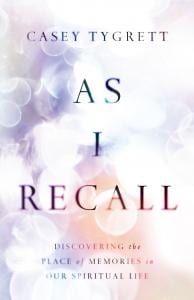I wrote a book called “As I Recall” – could we talk about it?
The process of writing and promoting a book is difficult. If you are writing in the area of Christian spiritual formation it is even more difficult because you do not want to appear to be a salesman.
And yet, we write books so that people will read them. I write so you will read. However, you won’t be able to read the book if you don’t know about it.
In that vein, I wanted to give you a snapshot of what the book is about.
On April 9, As I Recall: Discovering the Place of Memories in Our Spiritual Life officially enters the conversation space. I’m  excited about this book not only because it is the most personal thing I’ve written thus far, but because I hear so many stories in which memories create spiritual fissures.
excited about this book not only because it is the most personal thing I’ve written thus far, but because I hear so many stories in which memories create spiritual fissures.
Our relationship with God, self, and others is shaped by the memories we carry.
As a spiritual director, I find that most of my conversations have to do with things that have happened in either the recent or distant past. Hurts that people have inflicted or endured, confusion about “What in the world was that?,” and above all the question of “What was God up to when THAT happened?” came up time and again.
As I began to process these stories, I also started reading about how memories are formed. We have so many complex processes for taking in information through our senses and encoding it for later use. The hippocampus becomes the Uber driver of experiences, taking them from the short-term to long-term memory.
Except smells. We have no short-term memory for smells. Skunks, rotten milk, and vomit all go into the vault never to be discarded. Lovely.
Our life is like a walk on the beach. I’m reminded of times when my wife and daughter and I walked in the early evening along the Caribbean. We looked for shells, picking each one up and examining it. We saw the perfect shapes, ridged and colored with the artistry of a master. The shells that surprised us were the ones caked over with years of hardened algae, only to turn them over and find a breathtaking iridescent blue underneath.
These shells are all collected in a jar not far from where I’m currently writing. They instantly take me back to salty air, warm skin, and the calm of the waves.
We collect experiences like shells, and then they become stories.
Abuse comes to us by the hand of another, and we file that shell away with the story that “People will abuse us.”
Our parents scream with hate towards each other and we file that shell under “This is what marriage is supposed to be.”
We succeed at work or in school, and we put that shell under “I can accomplish things.”
We then take these stories and create scripts – ways in which we live as a result of all that has gone by. Abuse creates a need in us to take steps to protect ourselves. Marital strife creates energy in us to let bitterness reign. Success causes us to take risks, knowing we have the capacity to handle whatever comes.
In turn, everyone IS who they ARE because of their memories. They all belong to our life in the present.
We are all a patchwork of the stories that have come before, whether painful or poetic. For me, the next question seems obvious:
If we are who we are because of our memories, then the journey of spiritual formation must help us find the intersection of God in our memories.
In the book we explore themes like identity (Moses in Exodus), wisdom (Moses in Deuteronomy), emotions (Psalms), and the life with Jesus (Eucharist) through both contingency and resiliency (Revelation).
The end result is (hopefully) a set of ideas and practices that help us see our memories redeemed. My hope is that this book will help us see that amnesia or “moving on” is neither healthy nor possible. Instead, God desires to take what IS and redeem it for what can be both now and in the future.
Pre-orders are available now on Amazon, Barnes & Noble, and through the InterVarsity Press website. I pray this book is a blessing to you and that it helps you tell a new story about the “shells” that you carry.











